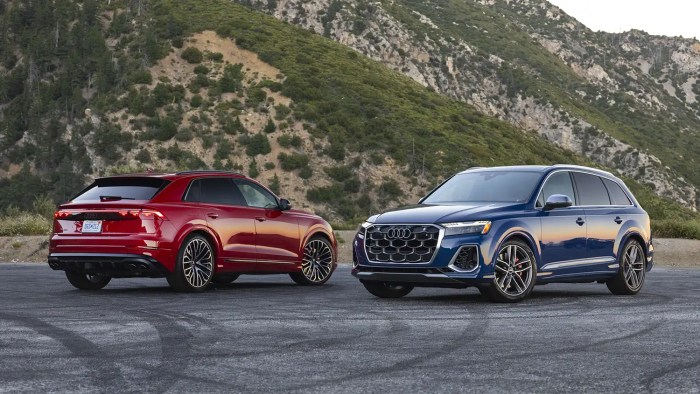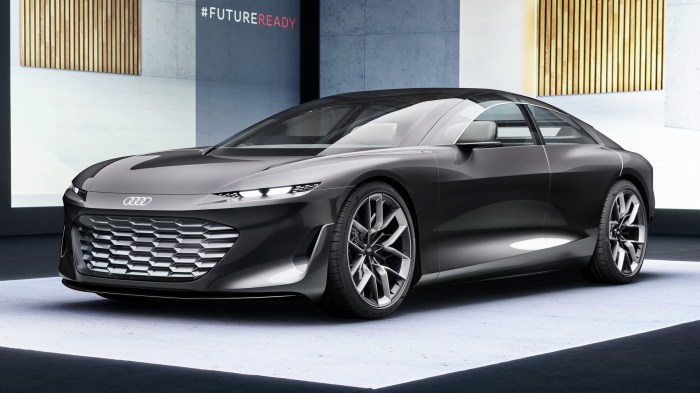Audi 2025 takes center stage as the automotive industry anticipates groundbreaking advancements that promise to redefine the driving experience. The year 2025 is set to showcase Audi’s cutting-edge technology, including a robust lineup of electric vehicles and innovative autonomous features. With a keen focus on sustainability and market positioning, Audi aims to solidify its reputation as a leader in the automotive sector.
As consumers increasingly demand eco-friendly options, Audi is expected to unveil impressive innovations in its electric vehicle lineup, coupled with advanced battery technologies that enhance performance and range. The brand is not only committed to reducing its carbon footprint but also aims to elevate safety and user experience through sophisticated autonomous driving capabilities and striking interior designs that embrace the future.
Overview of Audi 2025
As Audi steers towards 2025, the automotive landscape is set for a transformative shift with the brand’s commitment to advanced technology and innovative designs. This era heralds a new chapter for Audi, where electric mobility, autonomous driving, and smart connectivity converge to redefine the driving experience. The company’s vision encompasses not only the enhancement of vehicle performance but also the integration of sustainability into every aspect of their operations.The 2025 lineup is expected to showcase a diverse array of vehicles that align with the evolving demands of consumers and regulatory standards.
From high-performance electric vehicles to luxurious SUVs, Audi is poised to expand its market presence significantly. The anticipated models will feature cutting-edge technologies such as augmented reality dashboards, advanced driver-assistance systems, and state-of-the-art infotainment options, which promise to revolutionize user interaction within their vehicles.
Projected Advancements in Technology and Design, Audi 2025
Audi’s strategic focus for 2025 emphasizes groundbreaking technological advancements and innovative design philosophies that underline its reputation for premium automobiles. The integration of electric powertrains is set to be a cornerstone of Audi’s engineering, with a clear commitment to phasing out internal combustion engines in favor of fully electric models.The new designs are expected to reflect Audi’s commitment to sustainability and aerodynamics.
Features such as streamlined body shapes, lightweight materials, and energy-efficient systems will significantly enhance the overall performance and range of electric models. Additionally, the use of augmented reality in dashboards will provide drivers with real-time data and navigation assistance, thus enhancing overall safety and convenience. Audi’s focus on autonomous driving technology will further elevate the driving experience. The brand plans to implement advanced sensor systems and AI-driven algorithms that allow for higher levels of automation, potentially leading to fully autonomous vehicles by the end of the decade.
Anticipated Vehicle Lineup in 2025
Audi’s lineup for 2025 is projected to be robust and varied, catering to a wide range of consumer preferences while emphasizing electric mobility. The following models are among those expected to be unveiled:
- Audi Q6 e-tron: A mid-size SUV designed for families, featuring spacious interiors and advanced electric drivetrain options.
- Audi A6 e-tron: A luxury sedan that combines high performance with sustainability, offering a blend of comfort and cutting-edge technology.
- Audi R8 e-tron: The next generation of Audi’s iconic sports car, boasting enhanced performance metrics and a fully electric powertrain.
- Audi e-tron GT: A high-performance electric grand tourer that emphasizes luxury and speed, appealing to automotive enthusiasts.
The introduction of these models reflects Audi’s strategy to provide a comprehensive range of electric vehicles, ensuring that customers have access to options that suit their lifestyles while adhering to environmental standards.
Market Positioning of Audi in 2025
As Audi navigates through 2025, its market positioning is expected to reflect a strong commitment to sustainability and technological innovation. The company aims to establish itself as a leader in the premium electric vehicle segment, leveraging its heritage of quality and performance to attract environmentally conscious consumers.The projected market dynamics indicate that Audi will compete vigorously against other automotive giants who are also transitioning towards electric vehicles.
The upcoming Volvo XC60 2025 is anticipated to showcase cutting-edge technology and enhanced safety features. As the midsize SUV market continues to evolve, Volvo aims to maintain its competitive edge by integrating sustainable materials and advanced infotainment systems, ensuring a premium driving experience for its users.
By focusing on high-quality craftsmanship and integrating the latest technology, Audi is likely to maintain a competitive edge. The brand’s strategic partnerships and investments in charging infrastructure will further bolster its position, enhancing customer convenience and accessibility.In summary, Audi’s vision for 2025 showcases a commitment to excellence in electric mobility, innovative design, and advanced technological integration. This forward-thinking approach ensures that Audi remains a key player in the rapidly evolving automotive industry, meeting the demands of future generations of drivers while upholding its legacy of luxury and performance.
Electric Vehicle Innovations

Audi’s commitment to electric vehicle (EV) technology is set to revolutionize the automotive industry by 2025. The brand is poised to introduce a series of groundbreaking innovations that will redefine performance, sustainability, and user experience. With an increasing focus on electrification, Audi’s electric vehicle lineup aims to combine luxury with cutting-edge technology, catering to a growing demographic of environmentally conscious consumers.The advancements in battery technology will play a pivotal role in enhancing Audi’s EV offerings.
By 2025, Audi is expected to deploy solid-state batteries, which promise higher energy densities and faster charging times compared to traditional lithium-ion batteries. This innovation not only enhances vehicle range but also reduces charging durations significantly, thereby addressing one of the primary concerns of EV users—range anxiety. Furthermore, Audi’s strategic partnerships with leading battery manufacturers are paving the way for sustainable sourcing of raw materials, ensuring that their battery production aligns with their environmental goals.
Battery Technology Advancements
To ensure that their electric vehicles remain at the forefront of the market, Audi will implement several notable advancements in battery technology. The expected advancements include:
- Solid-State Batteries: These batteries are anticipated to replace conventional lithium-ion batteries, offering greater energy density, improved safety, and longer lifespans.
- Fast Charging Capabilities: Audi aims to enhance its charging infrastructure to support ultra-fast charging, significantly reducing downtime for EV owners.
- Battery Recycling Initiatives: Audi is likely to implement comprehensive recycling programs to minimize waste and recover valuable materials from used batteries.
- Smart Battery Management Systems: The integration of advanced software and algorithms will optimize battery performance and longevity, enhancing user experience and vehicle reliability.
Sustainability Practices
Audi’s sustainability strategy is positioned to be a cornerstone of its operations by 2025. The brand is set to adopt various eco-friendly practices that not only reduce its carbon footprint but also promote a circular economy within the automotive sector.Key sustainability practices will include:
- Carbon-Neutral Manufacturing: Audi plans to achieve carbon neutrality across its production facilities by utilizing renewable energy sources and implementing waste reduction practices.
- Sustainable Material Usage: The company is expected to increase the use of recycled materials in vehicle production, further minimizing environmental impact.
- Green Supply Chain Management: Collaborating with suppliers who prioritize sustainability, Audi aims to create a responsible supply chain that aligns with its environmental goals.
- Electric-Only Models: The introduction of fully electric models will significantly contribute to reducing greenhouse gas emissions and promoting a shift towards cleaner transportation.
Autonomous Driving Features

Audi is setting ambitious goals for its 2025 models, focusing on advanced autonomous driving technologies. The integration of these features aims to enhance safety, convenience, and overall driving experience, marking a significant leap towards fully autonomous vehicles. Audi’s commitment to innovation in this arena reflects their dedication to leading the automotive industry into a new era of mobility.Audi’s 2025 models will incorporate a range of key autonomous driving features designed to provide a seamless driving experience.
These innovations will not only enhance the vehicle’s operational capabilities but also ensure the safety of passengers and pedestrians alike.
Key Autonomous Driving Features
The following autonomous features are pivotal to Audi’s strategy for 2025 models, emphasizing both technological advancement and user experience:
- Level 4 Automation: Audi aims to achieve Level 4 automation, allowing vehicles to operate without human intervention in specific conditions, such as urban environments and highways.
- Traffic Jam Pilot: This feature will enable the vehicle to handle stop-and-go traffic autonomously, reducing driver stress and enhancing comfort.
- Highway Chauffeur: Designed for highway driving, this system will facilitate hands-free driving in specific conditions, optimizing speed and lane management.
- Predictive Navigation: Leveraging real-time data and machine learning, this feature will anticipate traffic patterns and suggest alternative routes to improve travel efficiency.
- Remote Parking Assist: Audi’s vehicles will be equipped with technology that allows drivers to park their cars remotely using a mobile app, enhancing convenience in tight spaces.
Safety Measures for Autonomous Vehicles
To ensure the safety of its autonomous vehicles, Audi will implement a multi-faceted approach. The safety measures are designed to protect not only the vehicle occupants but also pedestrians and other road users.
On the horizon, the new Jaguar 2025 promises a blend of luxury and performance that fans have come to expect from the brand. With innovative designs and electrified powertrains, Jaguar is set to redefine its lineup, aiming to meet the demands of modern drivers while preserving the brand’s iconic sporty essence.
- Comprehensive Sensor Suite: Audi vehicles will be equipped with a combination of LIDAR, radar, and cameras to provide a 360-degree view of the vehicle’s surroundings, enabling accurate perception and decision-making.
- Redundant Systems: Critical systems will have backups to ensure reliability, including multiple processors and communication channels that continuously monitor the vehicle’s functions.
- Real-time Monitoring: Constant monitoring of environmental conditions, vehicle performance, and passenger health will ensure that safety protocols are upheld at all times.
- Emergency Response Protocols: In case of system failure or unexpected scenarios, Audi vehicles will come equipped with pre-programmed emergency maneuvers to minimize risks.
Comparison with Competitors
Audi’s advancements in autonomous driving technologies position it competitively within the automotive market. Comparing Audi’s capabilities with those of major competitors provides insight into its strategic positioning for 2025.
| Feature | Audi | Competitor A | Competitor B |
|---|---|---|---|
| Level of Automation | Level 4 | Level 3 | Level 4 |
| Traffic Jam Pilot | Yes | No | Yes |
| Highway Chauffeur | Yes | No | Yes |
| Remote Parking Assist | Yes | Yes | No |
| Sensor Suite | Comprehensive | Moderate | High |
Overall, Audi’s commitment to integrating cutting-edge autonomous features, combined with robust safety measures, positions its 2025 models as frontrunners in the race towards fully autonomous vehicles. The strategic investments and technological innovations reflect Audi’s vision for a safer, more efficient future in mobility.
Interior and User Experience Enhancements

The interior of Audi’s 2025 models is set to transform the driving experience into a seamless blend of luxury, functionality, and technology. With a focus on comfort and innovation, Audi aims to redefine user interaction within their vehicles, ensuring that every journey is not only enjoyable but also tailored to individual preferences.Audi’s interior design changes will emphasize both aesthetics and ergonomic efficiency.
The incorporation of high-quality materials such as sustainable leathers and advanced textiles will elevate the luxurious feel of the cabin. Ambient lighting systems will utilize customizable color schemes, allowing drivers and passengers to create their preferred atmosphere. Additionally, Audi is expected to implement a minimalist design philosophy, reducing physical buttons and controls in favor of touch-sensitive surfaces, which will enhance the sleek, modern look of the interior.
New User Interface Technologies
Audi will introduce a range of innovative user interface technologies designed to enhance the driver and passenger experience. These advancements aim to simplify controls and improve connectivity within the vehicle. The importance of these new technologies lies in their ability to provide intuitive control over various vehicle functions while ensuring a safer driving environment. The following technologies will be featured in Audi vehicles:
- Touchscreen Display: A central touchscreen that integrates various vehicle functions and infotainment systems while featuring haptic feedback for tactile response.
- Voice Recognition: An advanced voice command system that allows drivers to control navigation, media, and climate settings hands-free.
- Gesture Control: A system enabling users to perform actions with simple hand movements, allowing for a more accessible interaction.
- Personalized Driver Profiles: Each user can save individual preferences for seating, climate, and media settings, enhancing comfort and convenience.
- Over-the-Air Updates: Continuous improvements and feature enhancements delivered directly to the vehicle without the need for dealership visits.
Impact of Augmented Reality on User Experience
The introduction of augmented reality (AR) in Audi’s 2025 models is poised to revolutionize the user experience, offering a new layer of interactivity and information access. AR will provide drivers with real-time data overlayed on the windshield, enhancing situational awareness and navigation.This technology allows for critical information, such as speed, navigation routes, and hazard alerts, to be displayed directly in the driver’s line of sight.
For example, as the vehicle approaches a turn, AR can highlight the correct lane to be in, ensuring safer navigation through complex urban environments. The immersive experience created by AR will extend beyond navigation. Audi plans to integrate AR features into entertainment options, such as displaying virtual landscapes or interactive games for passengers. This dual focus on utility and engagement will ensure that both drivers and passengers remain connected and entertained throughout their journey.
“Augmented reality will not only guide drivers but will also create a memorable in-car experience, blurring the lines between digital interaction and the physical environment.”
Global Market Strategy
Audi’s global market strategy for 2025 emphasizes significant expansion in emerging markets, where the potential for growth in the luxury automotive segment is substantial. By diversifying its product offerings and enhancing brand presence in these regions, Audi aims to gain a competitive edge. The strategy focuses on leveraging local partnerships, understanding consumer preferences, and adapting products to meet varied market demands.
Expansion in Emerging Markets
To effectively establish its footprint in emerging markets, Audi’s approach includes targeted market research and localized production strategies. This enables the brand to align its offerings with regional preferences and pricing sensitivities. Audi is particularly interested in regions such as Southeast Asia, South America, and parts of Africa. By utilizing these strategies, the company aims to capture a larger share of the luxury vehicle market.
Partnership Development
Strategic partnerships play a crucial role in Audi’s market strategy. Collaborating with local automotive manufacturers, tech companies, and infrastructure developers can facilitate faster market entry and improved customer insights. Such partnerships may include joint ventures to produce electric vehicles (EVs) and shared research on autonomous technology. By fostering these alliances, Audi can enhance its product development and distribution channels, ensuring a more robust market presence.
Promotional Strategies for Younger Consumers
Attracting younger consumers is essential for Audi’s growth trajectory. The brand’s promotional strategies are tailored to resonate with this demographic’s values and lifestyles. Social media campaigns, influencer partnerships, and experiential marketing initiatives are key components of Audi’s approach. By creating immersive experiences that showcase the technological innovations and sustainability efforts of their vehicles, Audi aims to build a strong emotional connection with younger buyers.
“Engaging the next generation of consumers requires innovation in communication and a commitment to sustainability.”
The integration of advanced technology and lifestyle-oriented features in vehicle design also plays a significant role in these promotional strategies. Audi is expected to emphasize its vehicles’ connectivity features, sustainability practices, and innovative user interfaces in marketing campaigns targeted at younger audiences. By focusing on these aspects, Audi is set to attract a new wave of customers who prioritize modernity and ecological responsibility in their purchasing decisions.